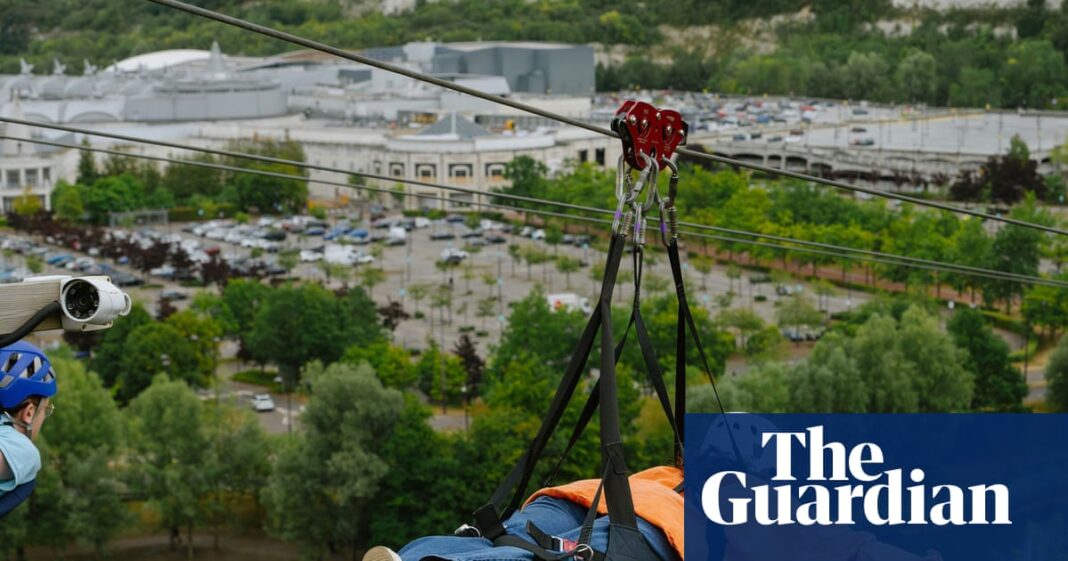There was a time when the most active thing to do at a shopping centre was jostle to the front of the queue at Primark. These days, however, developers are bringing in sport and health-related activities from zip wires to cricket, football, rock climbing and even wild swimming to draw in consumers and use space no longer wanted by retailers.
While the trend for competitive socialising, such as crazy golf, darts or bowling is well established and gyms are commonplace in shopping centres, landlords are getting more creative and adventurous in the type of activity they are offering as they battle lacklustre interest in physical shopping.
The activities are varied: Toca Social hosts diners watching and playing football in three shopping malls. US group Five Iron, which blends hi-tech golf simulators and coaching with a bar, has signed up for the first of at least 10 UK sites, at Broadgate in central London. Even the zip line adventure operators Zip World and Go Ape are understood to be talking to landlords about adding experiences to shopping centres and retail parks.
Such operators are helping to fill the gaping holes in shopping malls after the closure of hundreds of department stores and other big retailers after the switch to online shopping and more working from home. A fifth of the former Debenhams sites remain vacant, for example, more than four years after the department store exited the high street, while several former House of Fraser shops still stand empty.
Footfall has fallen in all but three of the last 12 months in shopping centres and was down 0.9% in October, according to the British Retail Consortium survey with monitoring firm Sensormatic.
While the big shopping centres continue to do well, smaller, less successful malls are suffering because chains want fewer but larger stores.
About 60 of the UK’s 500 bigger shopping centres are likely to be razed completely, and a further 200 could be partially demolished, analysis showed last year.
Retailers had historically paid more rent per square foot than leisure operators, the diminished demand for retail space has narrowed the difference and many deals are now tied to turnover so that landlords quickly feel the pain if a shop is unsuccessful.
Some centres have gone almost all in on sport and leisure. The former Centre Court shopping centre has been reinvented as Wimbledon Quarter – not far from the site of the annual tennis championships – under its owner Romulus, including an upmarket gym and members’ club, Third Space, and sports operator The Golf Groove.
In Cardiff, the former Queens Arcade is in the process of being reinvented as a “leisure mall” with live performances, sporting areas – courts for the increasingly popular padel – and interactive exhibitions and theatrics using digital projection.
Vivienne King, the chair of the executive board at shopping and leisure centre body Revo, says: “There has been a clear shift in what people expect from destinations, focusing more now on experience than ever before.
“It’s about creating memorable, shared moments for families and friends. These kinds of experiences encourage longer visits, repeat trips, and a deeper connection with the destination, so they are without doubt both commercially effective and culturally resonant.”
King adds: “Gen Z and millennials in particular clearly want to focus more on treating themselves, or what you might call ‘self improvement’, which can even include things like yoga studios and immersive play.”
Bruce Findlay, the managing director of retail at LandSec, the owner of Bluewater, says: “Wellness is more and more to the fore.” The vast Kent shopping centre could soon host an even broader range of activities, including an outdoor events arena that could hosts gigs or theatre, padel courts and potentially even rollercoasters to draw visitors from further afield.
Such experiences can’t work everywhere – some centres will not have sufficient space, indoor or out, or the right ceiling height to house experiences such as rock climbing or zip wires. Wimbledon Quarter’s climbing wall operator closed last year, citing problems with the space and difficulty in attracting enough visitors, for example.
While Bluewater has lots of space, LandSec has also been prepared to completely redevelop more urban centres to fit in activities. A former Debenhams at its Southside centre in Wandsworth, south London, has been transformed by the leisure operator Gravity, bringing a mix of go-karting, mini-golf and darts. A section of floor was knocked out for the climbing wall operator Parthian.
after newsletter promotion
Findlay says people are hungry for new ideas and “creating wonder” with events such as Europe’s biggest bouncy castle in Braintree, Essex, which attracted 10,000 people a week. He says such experiences offer a chance for families to connect and get away from staring at screens. “We are really tapping into social, outdoor play,” he says. “It’s things you can’t do online. It’s that simple.”
Katie Wyle, a director at Unibail-Rodamco-Westfield, which owns the Westfield shopping centres in east and west London, says its leisure provision has grown by 39% since 2022.
“People are craving an interactive experience rather than something passive,” she says. “It is about spending time, and money and then getting the selfies for afterwards.”
Wyle says the shift towards more working from home means people are now “wanting to be able to do everything that day” in a handy location when they do come into a city.
On top of sporting activities and cinemas, Westfield has lined up the 8,000 sq ft (743 sq metre) tech-enabled gaming experience Activate in London and will open the Wake the Tiger art experience.
The change in consumer demand has not only drastically altered the picture for landlords, but also sports operators. Jo O’Boyle, the marketing director of Go Ape, says it has considered moving beyond its park and forest locations. “It would have to be the right space,” she says. “We really need footfall and an almost complementary offer such as bike riding or forest walks. If we could replicate that, it is definitely something we would be interested in.”
Third Space has five of its 13 clubs in former department stores and forms part of the reinvention of the former Whiteleys shopping centre in Bayswater, London, where it will offer a martial arts dojo alongside cycle and yoga studios, steam rooms and a sauna.
Colin Waggett, the chief executive of Third Space, says it is being offered high-quality former retail space that landlords are struggling to fill.
“We are creating an attraction that is right for the here and now and what people want to be doing with their lives. With working from home, people want to get out of the house and go and do something,” he says.


